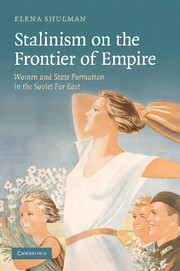Book contents
- Frontmatter
- Contents
- List of illustrations
- Acknowledgments
- Glossary
- Note on the text
- Introduction
- 1 Women and Soviet power
- 2 “Where steel cracks like glass”
- 3 “Our famous Valia”: the rise of a Soviet notable
- 4 “Envy for everything heroic”: women volunteering for the frontier
- 5 “Bol'shevichki were never ascetics!”: female morale and Communist morality
- 6 Snivelers and patriots
- Conclusion
- Appendices
- Selected bibliography
- Index
Conclusion
Published online by Cambridge University Press: 19 July 2009
- Frontmatter
- Contents
- List of illustrations
- Acknowledgments
- Glossary
- Note on the text
- Introduction
- 1 Women and Soviet power
- 2 “Where steel cracks like glass”
- 3 “Our famous Valia”: the rise of a Soviet notable
- 4 “Envy for everything heroic”: women volunteering for the frontier
- 5 “Bol'shevichki were never ascetics!”: female morale and Communist morality
- 6 Snivelers and patriots
- Conclusion
- Appendices
- Selected bibliography
- Index
Summary
Seeing women as active agents and not as inanimate props in propaganda exposes sources of support for the Communist regime. The willingness of thousands to go and to withstand horrendous conditions and distasteful obligations underscores the regime's ability to build loyal support without recourse to violence or material rewards. On the other hand, those they encountered on the frontier of Stalinism were just as likely to see everything as a charade of a repressive system, never accepted the regime as legitimate, and never cared to refashion themselves or learn to “speak Bolshevik.” Both ways of relating to the state existed at the same time.
This resettlement campaign and the migrants' self-perception do not support the argument that the second half of the 1930s ushered in a limited vision of women's roles as mothers and housewives. Their aspirations and limitations were certainly products of the imperfectly realized dreams of radical egalitarianism among Russian revolutionaries, and their choices were no doubt impacted to some extent by pronatalist policies. However, their lives after the supposed Great Retreat were not more troublesome nor were women's roles in society more circumscribed. The sources of their very real burdens and perils were more heterogeneous than a supposed turn by the regime toward emphasizing domesticity. Arguably, their lives were more profoundly impacted by the dissonance between the prospects of an expanded vision of their roles and recognition as frontier builders on the one hand, and on the other, the mass repressions and the GULAG system on the frontier of Stalinism.
Information
- Type
- Chapter
- Information
- Stalinism on the Frontier of EmpireWomen and State Formation in the Soviet Far East, pp. 222 - 231Publisher: Cambridge University PressPrint publication year: 2008
